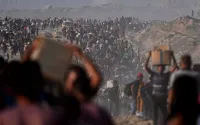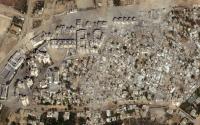20 November 2006Steve Bloomfield
The UN refugee agency began airlifting emergency aid to thousands of refugees after severe flooding hit a camp in north-eastern Kenya, sweeping away thousands of temporary shelters.
Up to 80,000 people, mainly refugees fleeing Somalia, have been affected by the floods which have swept through the Dadaab camp over the past week. Torrential rain has washed away much of the road leading to Dadaab from the main town in the Garissa district in the north-east, leaving the refugee camps isolated.
UNHCR yesterday flew in fuel, health kits and tarpaulins. Sanitation has deteriorated, making the likelihood of an outbreak of waterborne diseases, such as diarrhoea, cholera or typhoid, more likely. Flights from Nairobi began to deliver 25,000 tarpaulins to provide shelter. Fuel is needed for the camp's boreholes which provide clean water. UNHCR tried to deliver aid by road on Friday but four-wheel drive vehicles sank in the thick mud.
The "short" rainy season in Kenya, which tends to last for a few weeks in October and November, has brought severe flooding across many parts of the country. Torrential rain followed a long period of severe drought, which meant much of Kenya's farmland and arid plains were unable to absorb much water.
In Kenya's coastal region at least 12 people died and more than 60,000 were left homeless after sudden floods hit. More rain is forecast over the next fortnight. A dam in eastern Kenya is on the brink of bursting, according to the UN.
The rains failed last year, leading to a drought which aid agencies claimed left up to 11 million people in the Horn of Africa on the brink of a food crisis.
Dadaab, less than 60 miles from the Somali border, is home to three refugee camps. More than 160,000 refugees live there, many of them since fleeing the fighting in Somalia in 1991 when the last Somali government was overthrown. Numbers increased following the fighting between warlords and the Islamic Courts in Mogadishu in June.
Talk between the fragile, transitional government in Somalia and the Islamic Courts, which control most of the south of the country, have broken down, and regional analysts say the country is on the brink of war.
Mohammed Qazilbash, senior programme manager for refugee assistance for Care in Kenya, said: "What was supposed to be the short rainy season has turned into a widespread disaster affecting over 100,000 people.Food storage facilities have been flooded, latrines have collapsed and a significant number of shelters, including one wing of the hospital in Ifo camp, have crumbled."
http://news.independent.co.uk/world/africa/article1998824.ece






